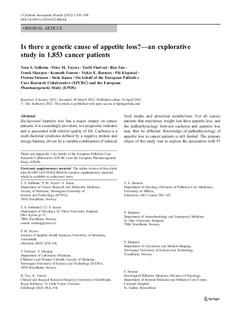| dc.contributor.author | Solheim, Tora Skeidsvoll | |
| dc.contributor.author | Fayers, Peter | |
| dc.contributor.author | Fladvad, Torill | |
| dc.contributor.author | Tan, Ben | |
| dc.contributor.author | Skorpen, Frank | |
| dc.contributor.author | Fearon, Kenneth C. | |
| dc.contributor.author | Baracos, Vickie | |
| dc.contributor.author | Klepstad, Pål | |
| dc.contributor.author | Strasser, Florian | |
| dc.contributor.author | Kaasa, Stein | |
| dc.date.accessioned | 2019-10-16T15:16:22Z | |
| dc.date.available | 2019-10-16T15:16:22Z | |
| dc.date.created | 2012-12-17T13:00:39Z | |
| dc.date.issued | 2012 | |
| dc.identifier.citation | Journal of Cachexia, Sarcopenia and Muscle. 2012, 3 (3), 191-198. | nb_NO |
| dc.identifier.issn | 2190-5991 | |
| dc.identifier.uri | http://hdl.handle.net/11250/2622642 | |
| dc.description.abstract | Background
Appetite loss has a major impact on cancer patients. It is exceedingly prevalent, is a prognostic indicator and is associated with inferior quality of life. Cachexia is a multi‐factorial syndrome defined by a negative protein and energy balance, driven by a variable combination of reduced food intake and abnormal metabolism. Not all cancer patients that experience weight loss have appetite loss, and the pathophysiology between cachexia and appetite loss may thus be different. Knowledge of pathophysiology of appetite loss in cancer patients is still limited. The primary object of this study was to explore the association with 93 predefined candidate single‐nucleotide polymorphisms (SNPs) and appetite loss in cancer patients to possibly generate new theories of the pathophysiology of the condition.
Methods
A total of 1,853 cancer patients were phenotyped according to appetite loss and then genotyped.
Results
After allowing for multiple testing, there was no statistically significant association between any of the SNPs analysed and appetite loss. The ten most significant SNPs in the co‐dominant model had observed odds ratios varying from 0.72 to 1.28.
Conclusions
This large exploratory study could not find any associations with loss of appetite and 93 SNPs with a potential to be involved in appetite loss in cancer patients. This does not however rule out genes putative role in the development of the symptom, but the observed odds ratios are close to one which makes it unlikely that any of the individual SNPs explored in the present study have great importance.
Electronic supplementary material
The online version of this article (doi:10.1007/s13539‐012‐0064‐8) contains supplementary material, which is available to authorized users. | nb_NO |
| dc.language.iso | eng | nb_NO |
| dc.publisher | Wiley | nb_NO |
| dc.rights | Navngivelse-Ikkekommersiell 4.0 Internasjonal | * |
| dc.rights.uri | http://creativecommons.org/licenses/by-nc/4.0/deed.no | * |
| dc.title | Is there a genetic cause of appetite loss? - An explorative study in 1853 cancer patients | nb_NO |
| dc.type | Journal article | nb_NO |
| dc.type | Peer reviewed | nb_NO |
| dc.description.version | publishedVersion | nb_NO |
| dc.source.pagenumber | 191-198 | nb_NO |
| dc.source.volume | 3 | nb_NO |
| dc.source.journal | Journal of Cachexia, Sarcopenia and Muscle | nb_NO |
| dc.source.issue | 3 | nb_NO |
| dc.identifier.doi | 10.1007/s13539-012-0064-8 | |
| dc.identifier.cristin | 974136 | |
| dc.description.localcode | © 2012 The Authors. Published by John Wiley & Sons Ltd on behalf of the Society on Sarcopenia, Cachexia and Wasting Disorders This is an open access article under the terms of the Creative Commons Attribution‐NonCommercial License | nb_NO |
| cristin.unitcode | 194,65,15,0 | |
| cristin.unitcode | 1920,12,0,0 | |
| cristin.unitcode | 194,65,25,0 | |
| cristin.unitcode | 1920,28,0,0 | |
| cristin.unitname | Institutt for klinisk og molekylær medisin | |
| cristin.unitname | Kreftklinikken | |
| cristin.unitname | Institutt for sirkulasjon og bildediagnostikk | |
| cristin.unitname | Klinikk for anestesi og intensivmedisin | |
| cristin.ispublished | true | |
| cristin.fulltext | original | |
| cristin.qualitycode | 1 | |

